
There are stories that Hollywood talks over and over again. In the case of "A Star Is Born" we watched the same story for the fourth time, each time returning to the same problem - a woman who is successful, and a man who destroys this success. The question is whether in 2018 this is an issue that we can look in the same way like in 1937. After seeing the version of Bradley Cooper I have an impression that this story today should end completely differently, and maybe start, or maybe it's just time to forget about it. (post contains spoilers)
The outline of all four "A Star Is Born" is always the same. A young girl, with obvious talent and dreams, wants an artistic career for herself. She meets a man (first actor, in later versions is a musician), falls in love with him and he lets her develop artistic wings. She is starting to succeed, he is falling into oblivion. She is rewarded, he discredits her on the ceremony awards. She wants to sacrifice her career to save their relationship, he takes his life, realizing that she is sacrificing herself. She performs the last time in the film paying tribute to her husband.
This scheme of the story, is something completely different in the pre-war cinema, the cinema of the 1950s and 1970s and, finally, today. A man before the war, who could not endure his wife's success - or even be named after her - could actually have appeared as a man in a tragic or unusual situation. Although it was already then noticed that his behavior was not right - however, the tragedy mainly concerned him. In the fifties the devotion of a woman to a man was treated by the viewer much more implicitly - hence again - the withdrawal by a man from the frame can be considered more noble. After all, since a woman is required to sacrifice, the only way to save her from him is to end his life. The version from the seventies, although already taking into the new wave of feminism, but was still happening in a world where jealousy for feminine success could not necessarily be considered as something strange. The man could expect that his wife would do him good politeness and she would not break out of his achievements.
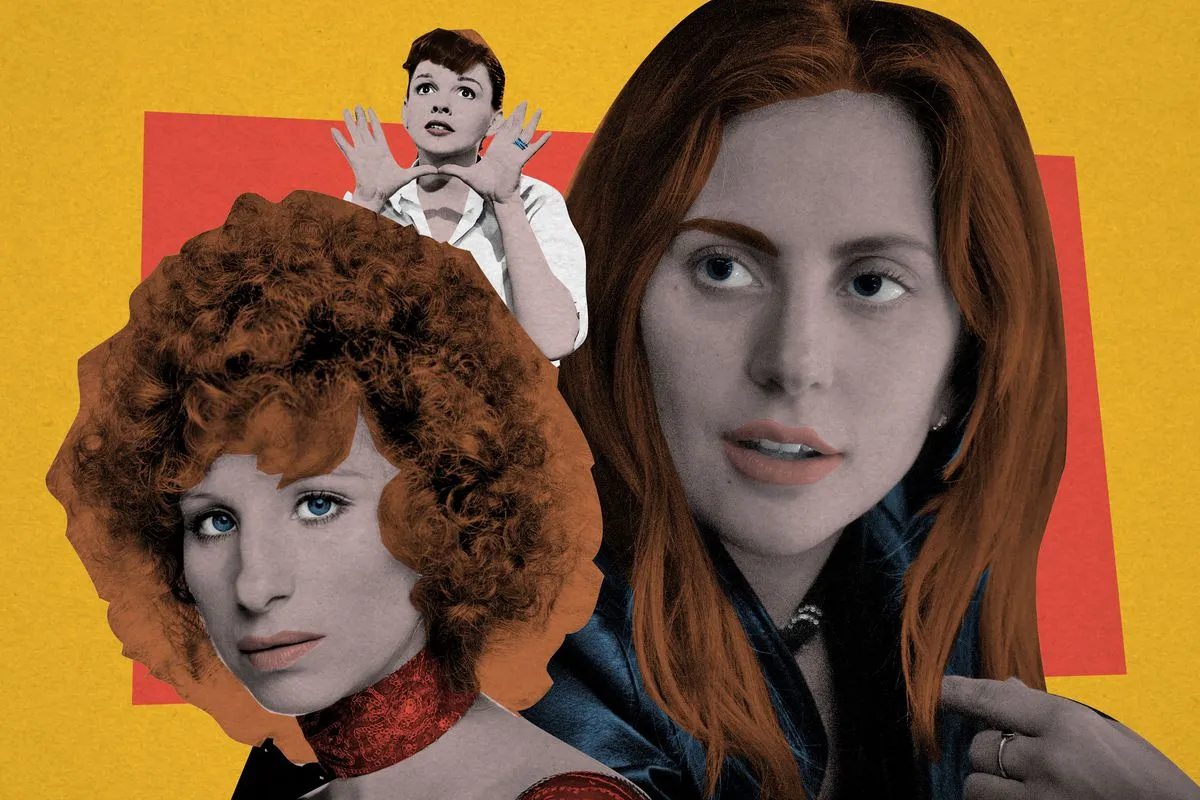
In 2018, we are in a different moment. The last decades of the fight for gender equality have meant that today some elements of history are different. A man jealous of his wife's success in 2018 is a guy completely different than the one from a few decades ago. It is harder for us to understand him, it is harder to empathize with him, it is harder to finally understand his constant pretension. What could have been a surprise for a pre-decade hero for a modern man should be a matter of course - every person regardless of the sex with which you are in the relationship can be more successful than you. If you can not deal with it, you have a big problem. The second thing is a tragic ending. While for decades the protagonist's suicide could be treated as the release of his wife from a certain situation from which she could not get out otherwise - a socially imposed obligation to sacrifice, today it seems that the hero's suicide is primarily depriving the girl of her choices. The man decides about the whole course of the relationship. The heroine absolutely does not have to sacrifice - if she wants to - and it is not a final sacrifice (because the heroine wants to shorten the tour, not throw the stage) - is her right. Nowadays, we read the suicide quite differently - there is no sacrifice in it which is the only way out for the heroine - it is a gesture that can be read through the prism of the hero's default depression but also seems to be a dangerous showing of suicide as a romantic escape from the tragic situation . One may wonder why the hero just decided not to divorce. Something that was not necessarily possible as a good ending in 1937 or adopted in the fifties, today would be a bitter end but probably more interesting, and above all more logical. The hero committing suicide in 1937 also does so in order to avoid the scandal of divorce, the hero committing suicide in 2018 provides his wife with a scandal many times over that which would accompany another star divorce.
Bradley Cooper - in the double role of the actor and director, he decided to enrich the story of his character. We learn more about its origin, the sources of its addiction, and relations with family. The whole frame is to give us to understand that the context of the hero's behavior is much wider than just jealousy of fame. We can read this as a conscious extension of the role - which is to show how toxic masculinity is forming which sends the guys to the bottom. What is all the more correct that what was the default view of the world in 1938 is not so in 2018. But on the other hand - it turns into a series of explanations at some point - he is like that, because father, he is like that because of his brother, he is like that because he is talent, he is like that because of alcohol, he is like that because he is losing his hearing, he is like that because he is a drug addict. Millions of explanations that are here to convince us that the guy who shapes him is not really bad. And there would be nothing wrong with that, only in the end we get a movie about a pretty nasty guy who justifies everything. The film is supposed to make us feel compassion for a man who breaks down his addiction, pride or jealousy. And again, there would be nothing wrong with it, if not for two things. First of all - we know this story from the inside out, it's very sad when the musician drinks and is not very nice, but are we really only able to talk about men? Always looking for this explanation outside of them, taking responsibility from them. After all, surrendering to all this - society, smallness, jealousy, there is also a choice (not just a man, each individual). The film completely ignores the fact that the hero chose to immerse himself in all of this and even if he did not choose it - it deliberately stays in it (because the decision to change the way of life he can take). Secondly - I have a serious problem with the fact that in connection with the story of relationship and love, the whole has a taste of such a dangerous translation of an unpleasant alcoholic in front of his loved ones. Well, this topic in culture has been repeated many times - tormented creators who are so delicate that they can treat everyone like trash. Maybe if the hero was not an alcoholic - he was just a nasty, movie would not create such a sense of discomfort. And again, as I wrote - alcoholism explains a lot, but at the same time it does not give final absolution.

I also have a problem with the music thread in this movie. The hero meets a girl, gives her a pass to the world of great music. Ally is making a career - not necessarily on her own terms, changing her hair color, clothes, sung lyrics. Bradley's character has a grudge against her. The movie is full of heart for the fact that there are two music - the real one that you can tell the world and the artificial one created only for entertainment. Although the protagonist's arguments are supposed to be evidence of his jealousy, the creators specially set up the lyrics of a pop song, with deeper lyrics of earlier songs. I have a problem with this thread for two reasons. First - because the director and the whole film is focused on the man, the protagonist's arguments - that with the music industry you can not win when you are a woman, they dissolve completely. When Ally at the beginning of the movie says that her nose stops her from making a career, a great rocker tells her that it is not nose but fear stops her. When Ally makes a career by adapting to the label's requirements, it's not good either. And although they both argue, Ally's music is shown as inferior and shallower. And the most annoying thing is that Lady Gaga herself showed best that between the wig, the challenging outfit, the complicated dance choreography and the deeper content is not necessarily the limit, as the film suggests. No less - I have the impression that the creators may not like the protagonist, but it is not that they do not agree with the quality of music performed by Ally. A poor girl should get some trauma and addiction to alcohol, probably then she would get the title of a real star.
Each director of "A Star Is Born" must decide about who this story will be. About a girl whose career means the break-up of a relationship and tragedy, or about a man who is unable to cope with the success of his wife. I have no doubt that Cooper consciously made a film about a man. He had the right to do so. In the end well-told male stories are needed. Which does not change the fact that all the time I had the impression that this movie is talking about Ally's narrative. Whenever a girl raises her voice, she is silenced, guided or brought to the "right path" by men. Even when Ally at the end of the movie is experiencing what has happened, a man appears and will explain to her what is the proper narrative about her own relationship. When Ally at the beginning does not want to be associated with rockman, a father appears who almost pushes her in his arms because of fame. Ally's decision-making is almost nil in this film. Everything is done with her, her story is happening to her. Even the song she wrote is taken away from her without asking about permission - at least partly by a man. The only completely independent decision that a girl makes throughout the movie is to tell Jackson that she has a job the next day and will not go to a concert with him. God, how reasonable. I write about it because it shows nicely how the success of a woman in this film is really a success of men achieved through the talent of a woman. And here we can argue - is it especially shown how much the women in the show business rule men, or is it so much a movie about a guy that nothing without a male element can not do here. Alternatively - as sometimes happens in scenarios - because there is only one woman in the film it is actually obvious that she can do nothing without men. Anyway, you could have a look at how easy it is to make a movie about a woman without women.
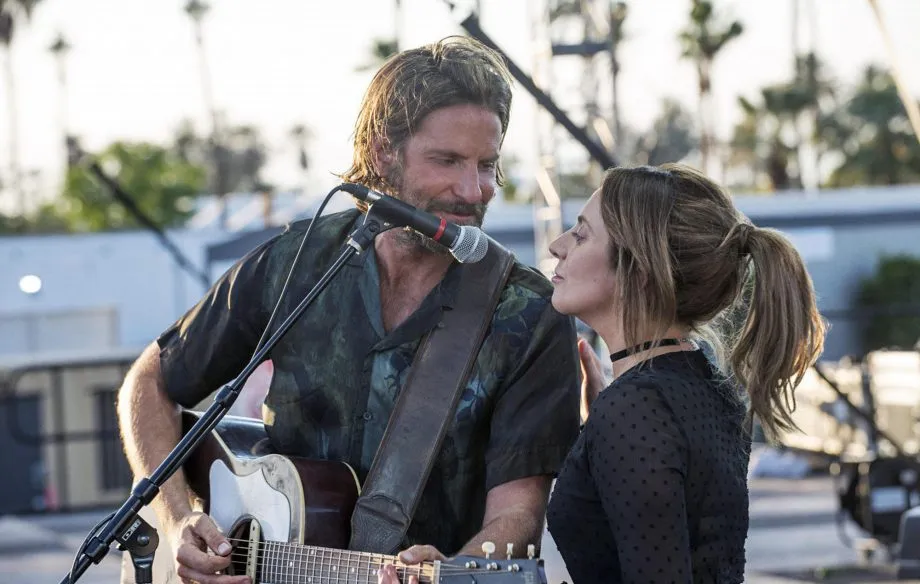
I also get the impression that certain film scenes have become much more cruel over time than they would have been in the original. Today, when we look at the hero's behavior towards his girlfriend and then his wife - we see them quite differently than the audience, thirty or sixty years ago. There is much more violence in this relationship than it was before. Instruction regarding music, the scene at the bathtub, the engagement or the scene on the ceremony awards because of the fact that it takes place today, has become incomparably more cruel than it probably would have been in earlier versions of the story. All the time I had the impression that this dimension of history was lost by the creators. And actually - that aware of this change they could not find a completely new framework for history. What's the whole problem in the whole movie.
Let's talk about acting for a moment. I have a problem here. I have no doubt that Bradley Cooper would like to get an Oscar for this role. In total he owes - he played an artist who was struggling with addiction and died prematurely. If only Rami Malek did not get in the parade with him playing a real artist, he would probably be hugging the virtual Oscar statuette to his chest. Bradley does not play bad, though in my opinion - he has had better roles. It is good for him to show such eternal drunkenness - the hero does not have to drink on the screen so that we can smell the alcohol and sweaty clothes on him. He sings well too - it's not hard to believe that he could be a popular, well-liked singer with crowds at concerts in Arizona. Lady Gaga is also delightful, especially at the beginning she plays with such sincerity and delicacy that she wants to clap, that she managed to create a role without any falsity. Her playing is excellent and I do not hide it altogether - it's hard to believe that she is a singer, because her sense of camera, differentiation of emotions, playing with a small gesture or change of tone she has mastered as she has been doing it for years. Plus, God, she has an amazing voice. So that when she starts to sing, a man wants to go with her through this melody and feel everything that she feels. It's a little hard to believe in a film reality where such an amazing talent has to be found out by accident. You can even argue that she does not sing well as a person who for years has been doing it only amateurish (according to the film).
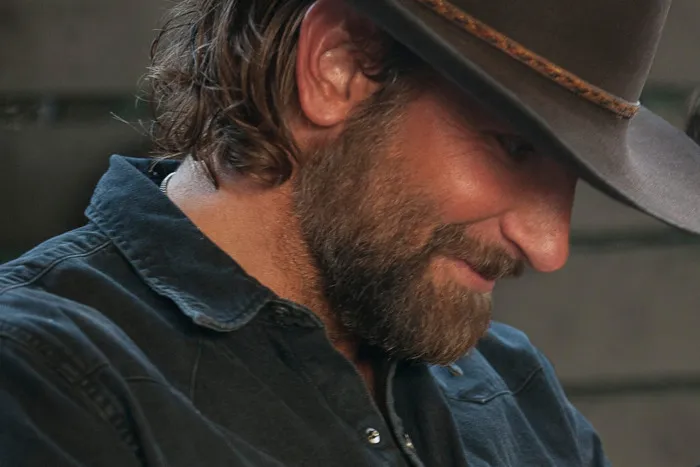
What's the problem? The fact that there is no screen chemistry between them. Actually, they do not have the chemistry they should. In the first scenes when they meet at the bar and move into the night, we should feel such an agreement of souls, infatuation, cognition despite class differences, fame, age. Meanwhile, the film is completely unable to give us that feeling so that we would believe it. The hero gives the impression of unpleasantly insistent, Gaga herself plays as if she was more frightened and terrified than intrigued. I could hardly see this part of the movie all the time having the impression that this is exactly the moment of the story in which the protagonist should fly off the intruder as soon as possible. The second thing is the fact that then their relationship - the moment in which we can understand what connects them is shown on acceleration. The rest is showing them basically separately. And that's because the chemistry between the actors is not obvious, the great feeling that is cementing the story somehow does not appear. If it was intended, then in my opinion it is wrong because it deprives the film of emotional depth.
Exactly. Emotional depth. In a film that we shoot one more time if we can not propose a new story or a completely new lead, we can propose an emotional kick that hides everything. But this film has the impression, instead of emotions, it gives us talks and sentences straight from the diaries of "How to be a very masculine, but a bit of an exalted man". Someone is successful, someone is rolling down. The one who was first is the last one. Success costs (though a longer bill is issued to a woman). You can not be talented and live in the world at the same time, you have to drown out the pain, that's why main character is drinking. See he is drinking, but he's not that nasty drunk as usual, because you know his opinion about music. It may even be repellent for a while, but it's a great tragedy altogether, because it's not drunk but a falling star. And so on. I do not hide - I am getting tired of this narration, which is served to us in different arrangements - either by using a biography or by reaching for fictitious stories. In the end, they always have to overcome mitigating circumstances. And although I understand that they often occur, I have the impression that in our culture we are still too often talking about the sufferings of drinking musicians, and not enough about people who suffer from drinking musicians. Too often, reasons are somewhere else (usually we reach for parents) and this element of choice - which, after all, must always appear somewhere there, is pushed into the third plan. Meanwhile, not everyone who has a difficult childhood or is a talented musician or writer will become an alcoholic. This is not a curse, it is up to a certain one (although of course there are predispositions and this can not be denied - that's why we should not approach addicts only with aggression and grudge) the way of life. Moreover, while alcoholism itself is a disease, not everything can be absolved. Perhaps the rescue for ”A Star Is Born" would be at least once to tell this story only from the perspective of Ally.
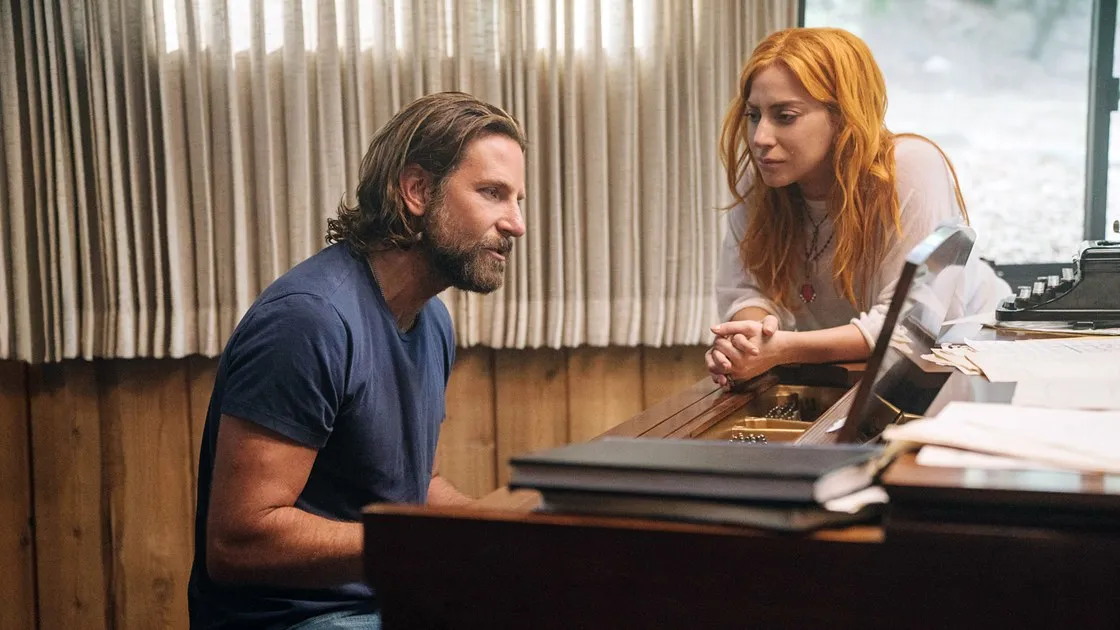
At the end I wonder how this film can be read by modern men. We can of course read this as a parable - see this man was so masculine that he drank, he was jealous and died because his manhood told him. The problem is that it seems that the man from 2018 will not killed himself and it would be pretty cool to show him some exit door. For example, the hero is divorcing, takes responsibility for his actions, understands that he is not the main point of the world. Where the narrative becomes potentially the most interesting, it breaks off, and there is nothing on the screen but toxic manhood. If you are seen by someone immersed in this culture, it is not so clear that this suicide is a bad idea after all. On the contrary - it is shown so that some viewers will calmly read it as a just honorable solution. See the viewer, he did not let the woman sacrifice, he was so noble, and now she is singing. Which only strengthens the scheme of toxic masculinity and does not deny it. Especially that the protagonist may be an unpleasant drunkard but otherwise he is a cool intelligent artist. But maybe he is right? I have the impression that there is a lot of confusion in this film. Because it is not so obvious that the choice of the hero has been condemned. And if you treat suicide as evidence of taking responsibility for your actions, it is even worse. In the last scenes of the film, everything again focuses on his ego, his feelings and not on others. Even at the end, the hero does not think about his wife only about himself, about how he is a burden. As if he did not know what a suicide of a loved one is. Even in the final scene, when Lady Gaga sings a romantic ballad, the movie puts him more in the center than her (his song, flashback to him, look at the sky - it's for him and not about her). In the end, the movie does not know what it wants to say to the guy from 2018. Maybe because the story have 90 year now and despite modern decorations its not suit anymore to our times. It's a bit sad that we think that guys have not changed during those decades. Because although many elements may not have changed, there is something infantile about this, that this story must be arranged in the same way every time.
"A Star Is Born" when they first appeared at festivals has been hailed by many reviewers as the greatest assurance of this year's awards season. However, with time the enthusiasm subsided and today more often talk about Oscar for Gaga and for the song (I'm not surprised Shallow is poignant and excellent). I have such a bad idea that the perception of the film changed when instead of reviewers (who are mainly men) about the film began to write women who went to the cinema. Because it is impossible to hide - the reaction of my friends to the film was drastically different than that of newspaper reviewers. Perhaps it is one of those productions whose reception really depends on sex. No less - I hoped that Cooper would add a bit more of modern depth to this narrative of toxic masculinity. This time I have the impression that he focused on translating to us why his character behaves as if he was removed from 1937 (or from another older version), that somewhere he missed that this story requires a bit more corrections. Who knows maybe the most important thing would be to sit over by a piece of paper and write it again. Quite. Because such a completely modern ”A Star is Born” would be useful. But the ones that filmed Cooper are like a fence near my house. Every year, they were painted anew, so in some places the paint broke off showing the previous color. At one point completely spotted, and how's the story in this film - interwoven with previous interpretations. And in many films it enriches, but in a film telling about male-female relationships in the context of professional success, it is these prints that make it hard to see.
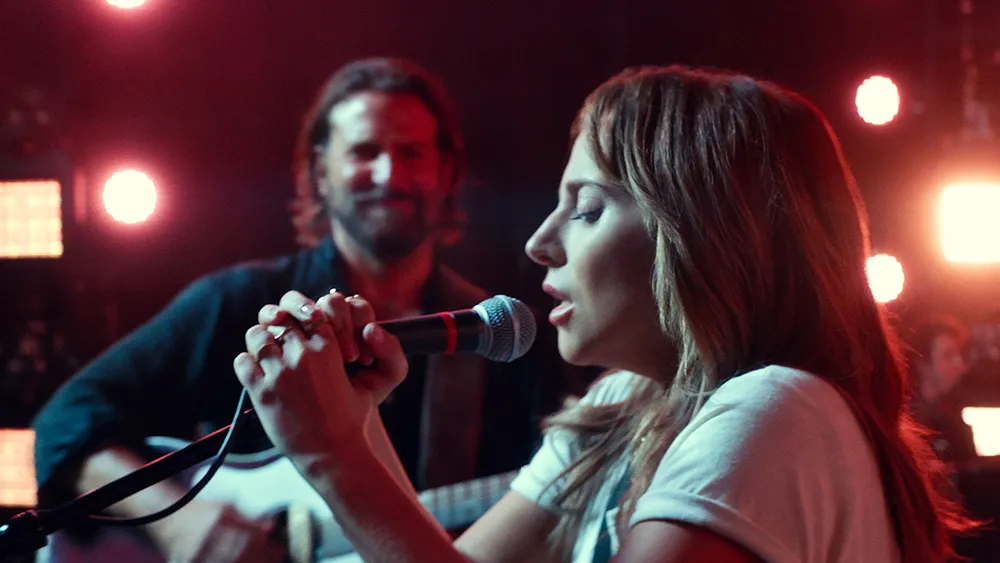
I know that many people like this film. Perhaps it is a matter of difference of experience, attitude, sensitivity - this is not a film that is badly implemented. There are no classic errors in telling stories. Cooper does not show that he is behind the camera for the first time. He creates a coherent film, with good photos, excellent cast, and really combines everything with music. It is not like a movie that often can not be seen. But that's what my problem is. This is a movie that has all the elements that indicate a good movie, except for the story that a large part of the audience rejects, and incredibly frustrates. Which is frustrating in itself because it is easier to judge badly a film that at every stage has errors than one that, having everything to achieve success, eventually fails. Although I have no doubt that in twenty years someone will shoot the completely new version of this story. But maybe this time they strip off all the old paint and start at the very beginning.